“Lebanon’s Exodus” by Rana Fil: Newsweek
Posted by Joshua on Wednesday, December 12th, 2007
Quick Quiz Question
The flight of Christians from the Middle East has been caused by…
a) the expansion of Islam in the Middle East
b) the rise of the modern nation state
c) the clashing crusades of George Bush and al-Qaida
d) the growth of a Jewish state in the Holy Land
d) the economic draw of wealthier Christendom
e) all the above.
The following photos are all thanks to Alex and Creative Syria
Lebanon’s Exodus
As Beirut's latest political crisis drags on, more and more Christians are leaving the country.
By Rana Fil | Dec 11, 2007 | Newsweek Web
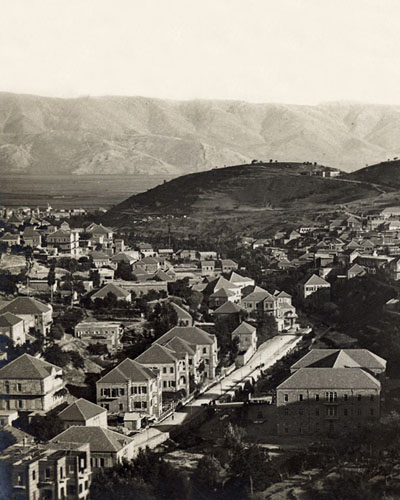
[Photograph of Zahle, in the Bekaa Valley in Lebanon,1940's. " The town occupies both sides of the valley ,which widens as it deepens, and finally opens out upon the plain to the south-east. Through the middle of the valley flows the sparkling little river of el-Barduny, which descends from the south-eastern end of Jebel Sunnin. There are several churches in the town, including one recently erected by the Protestant Community. Excellent schools, both for boys and girls, have been established , and are flourishing remarkably. The population is over thirteen thousand – all Christians, principally of Greek , Catholic and Maronite sects – and is steadily increasing. " [THE LAND AND THE BOOK, W.M.THOMSON 1886. Web photo taken from Camille-Alexandre Otrakji's site]
Lebanon's political stalemate was supposed to be resolved weeks ago. Instead it drags on, with Tuesday's parliamentary session to elect a new head of state now postponed for the eighth time since September. And as the impasse continues, Lebanese Christians are becoming increasingly frustrated with what they see as an unprecedented threat to their political influence. "It is the first time in the history of Lebanon that Christians feel so demoralized," said Elie Haddad, Greek Catholic Archbishop of Saida and Deir el-Kamar. "I have never seen such despondency, even during the civil war."
The trigger for Lebanon's latest crisis is the ongoing dispute over finding a successor to pro-Syrian President Emile Lahoud, whose term expired Nov. 23. Parliamentary leaders have tentatively agreed on compromise candidate Gen. Michel Suleiman—but are still squabbling over how to amend the constitution for the army chief to assume his new position. For the country's Christians, however, the dispute over Suleiman has an even deeper significance. Many see it as underscoring the subsidiary role played by Christian leaders in Parliament's two main factions: the ruling, pro-Western March 14 coalition led by Sunni Muslim Saad Hariri and the Hizbullah-dominated opposition led by Shiite leader Hassan Nasrallah. "Christian leaders are divided among themselves at a time when the Shiites are united and the Sunnis are united," says Rajeh Khoury, a columnist at the daily An-Nahar newspaper. "The more divided they are the weaker their role is in Lebanese politics."
For many Christians these developments are fueling a new rush to leave the country. Church leaders say they are growing increasingly alarmed at the accelerating pace of emigration and what Greek Orthodox Archbishop of Mount Lebanon, Georges Khodr, calls "a visceral sense of their disappearance through emigration." Haddad says that large numbers of Christians are selling out if they can afford to leave and that others are staying "with total resignation to the current situation." Other clerics echo similar sentiments. "We see people rushing for visas, and emigration continues unabated," said Msgr. Boulos Nasrallah, of the Maronite bishopric of Jbeil. "But we have faith that this is our country."
Nobody knows exactly how many Christians have left because of the political sensitivity over the collection of statistics. Christians now make up less than 40 percent of Lebanon's population—indeed, some estimates put it as low as 30 percent—and they fear that confirmation of their declining numbers will lead to Muslim demands for increased political representation. (Continue reading Lebanon’s Exodus)
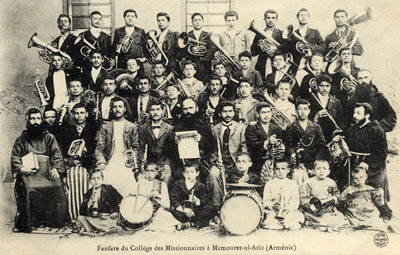
Post-card,ca. 1912, of an Armenian Missionary school band from Mamouret al-Aziz,known as Kharput, or Harput,[current Elazig], with a large Armenian and Syriac community prior to W.W1., located in Eastern Turkey, perched with its famous castle on edge of a hill. " The castle for all its frowning walls and bastions , is nothing but a heap of ruins within. I looked in vain for the dungeon s in which Sukman, the son of the Turkman officer, Ortuk,founder of the Ortukids dynasties, imprisoned Baldwin of Edessa and Jocelyn of Courtney in the early years of the twelfth century.The Crusaders, gathering together their forces ,seized the fortress in 1123,and held it until Balak, Ortuk's grandson, recaptured it." Gertrude Bell, Amurath to Amurath 1911. (From Alex's collection again.)
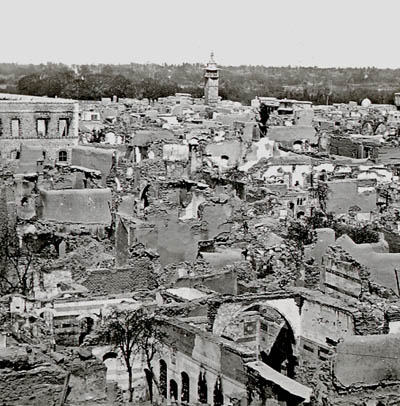
Glass-photo, ca 1860, of the destruction of the Christian Quarter in Damascus in 1860. The violent incident started on the 9th of July, when a mob of 20,000-50,000 from the Maidan, and Salihya districts of Damascus attacked, killed and pillaged the Christian Quarter and its inhabitants, 5,000 to 12,000 were estimated to have perished. The Greek Orthodox, the Greek Catholic and the Armenian churches were the first to be burned. The Russian consulate was the first to be attacked, followed by the French, then the Dutch, Austrian, Belgian and the American consulates. Abdu Costi, the American Consul was beaten and left for dead. The Prussian and the English Consulates were saved. "AN OCCASION FOR WAR, Leila Tarazi Fawaz, University of California Press, 1994". Abdul Qadir al-Jazairi, the exiled Algerian hero, along with his 1000 volunteers protected most of the Diplomats, and thousands of Christians in his houses. He was awarded the highest medals by the European governments. The building on the left is the French Lazarists Monastery and school burned by the attackers. (Photo thanks to Alex on the web)
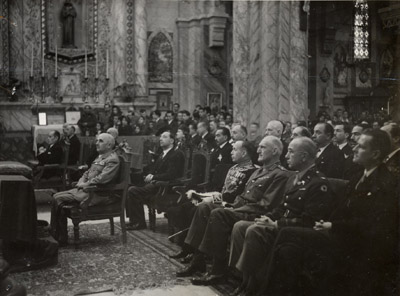
Photograph, ca.1942, by photo Gulbenk ave. des Francais, Beirut, Lebanon. The photo was taken on Christmas day, 1942. On its back, United States Col. Frank A. Derouin wrote "The Pontifical high mass at the Cathedral of Saint Louis des Francais, Beirut Christmas 1942. President Naccache of Lebanon, General Humblot (representing General Catroux, absent), diplomatic Corps etc. I am in the front row because representing Mr. Wadsworth, our diplomatic agent, who himself, was attending the parallel Anglo-American Protestant ceremony accompanied by captain MacBryde. The lady seated further is Mme Catroux". The Easter Monday mass, called the "Consular mass" was held at the Maronite Cathedral, since 1860, by the Consuls of the six powers that guaranteed the autonomy of Lebanon.
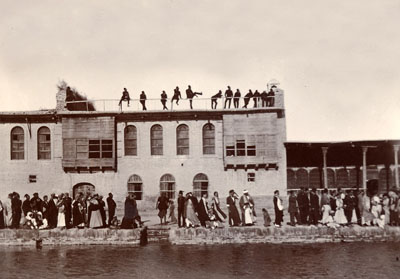
Photograph of the town of Amara in southern Iraq along the Tigris River, dated 1905, during the Ottoman period. Passengers are seen waiting for the steamer that traveled between Basra and Baghdad. The town had a large community of Mandeans [Knowledge, or Gnostic], also known as Sabians (Baptist), or St. John the Baptist followers. The Sabians, known for their gold and silver craftsmanship, were famed astronomers, physicians, and mathematicians, especially during the Abbasid Dynasty (8th-13th century). Their first prophet is Adam, and the last Yehia bin Zacharia (St. John the Baptist) Monotheist in their beliefs(azalyieen, believers in the Eternal Life), their language is Aramaic/Chaldean, and their main holy book is the Ginza (The Treasure) Raba. Urfa (also known as Raha, Urhai, Edessa) in northern Syria (now part of Turkey), was a major center for their Gnostic teachings, lasting well into the Islamic Era.
Discover more from Syria Comment
Subscribe to get the latest posts sent to your email.


Comments (4)
Thomas said:
Professor Landis-
I appreciate your coverage of the Christain exodus in Lebanon and generally the middle east. The pictures are great. I often criticize your commentary, but I really appreciate your historical perspective as presented here.
December 12th, 2007, 9:45 pm
Friend in America said:
I think the overriding concern is the prospect of another civil war. A companion reason is discouragement with the economy. A growing economy requires a stable political environment and that does not appear possible for some time.
January 2nd, 2008, 8:40 pm
wizart said:
FIA,
One of the minor reasons could be the early morning Islamic calls for prayer that happen in residential areas where mixed religions co-habit 🙂
As for your concern of a civil war like there was in Lebanon, I think the prospect for that is very unlikely at the moment. I think a war with an American proxy like Israel is more likely than a war within.
Nobody knows what the Lebanese gained through a civil war. Everybody knows the area has been subjected to different outside aggressors and what Syria has proved is a long standing stability and overall religious tolerance despite a difficult experience in the early eighties related to Islamic fundamentalism.
April 15th, 2008, 5:26 pm
wizart said:
LEBANON: Assassinations Shake Christian Town
By Mona Alami
BEIRUT, Apr 24 (IPS) – The lush Bekaa Valley is nestled between snowy Mount Lebanon and the Syrian border. The region, reputed for its wine production, was this week the witness to a violent crime in the Christian city of Zahleh, where two members of the anti-Syrian Kataeb party (Phalangists) were gunned down.
In the courtyard of Zahleh’s Catholic diocese on Tuesday, Apr. 21, it seemed a white wedding was taking place. White bouquets bloomed along the ancient stone walls, while people standing by window panes threw rice on the crowds below. Music floated in the air, and huge crowds crammed by the large church, singing Kataeb party anthems.
The illusion of a happy celebration vanished, however, upon the appearance of two coffins at the bottom of the hill, carried by the crowd amid tight security.
Since the 2005 killing of former prime minister Rafik Hariri, Lebanon’s ruling anti-Syrian majority — comprised of the Christian Kataeb party and Lebanese Forces (LF) as well as the Druze Progressive Socialist Party (PSP) and the Sunni Future Movement — has been hit by a series of bombings and assassination attempts against their deputies, ministers, journalists and party members. The murders of Selim Assi and Nasri Marouni add to an already long and morbid list of casualties.
The two victims were gunned down last Sunday at about 4pm allegedly by Joseph Zouki, who is accused of staging a shootout targeting the newly inaugurated Kataeb headquarters at Hawsh al-Zaraaneh in Zahleh.
“Zouki was driving though the neighbourhood since the morning; he was stopped by the police at a road block during the time of the inauguration. But, as soon as the army and interior forces left, he moved towards the Kataeb headquarters and started shooting,” said eyewitness Brahim Dagher.
Investigators at the crime scene found 26 bullet casings from a Kalashnikov and another type of handgun. The suspect’s car, a Jaguar, which was later found abandoned, was hit by a single bullet. The suspect is believed to have fled with his brother, Tohmi, who allegedly also played a role in the attack.
According to Zahleh inhabitants interviewed by IPS, Zouki, who was imprisoned on several charges, was a close ally of MP and former minister Elias Skaff, a member of the opposition. Skaff and Gen. Michel Aoun, head of the Free Patriotic Movement, a leading Christian party and opposition member, both claim the killing is an isolated incident.
On the day of the funerals, political flags of the Future, Kataeb and LF majority movements floated high in the air. Young men and a few women clad in black proudly waved their banners, as former president Amine Gemayel — father of MP Pierre Gemayel, who was shot to death in his car two years ago — passionately promised justice for the crime.
“We may not know who killed Pierre, but we know who committed the Zahleh crime. It will not go unpunished!” Gemayel said, visibly shaken. From beneath the staircase leading to the first floor, where Gemayel was giving his speech, the crowd repeatedly chanted: “Pierre lives in us, Pierre lives in us.”
In a radio interview the same day, Gemayel accused Skaff of possessing “advance knowledge” of the Zahleh shooting. He urged Skaff not to involve himself in a battle that was much bigger than him, and to stop playing with fire. “We (the Kataeb party) behave with a sense of responsibility, but our duty is also to protect ourselves and our families. I ask you to hand in the criminals without any further delay.” A massive manhunt for the two suspected killers is currently under way throughout the Bekaa.
Oussama Stambouli, a Zahleh resident, expressed shock at the killing. “This is the first time such a crime takes place in our city. We’re all Christians in Zahleh; we are like one family and know each other very well. We may disagree with each other, but this should not lead to a killing,” he said, adding that he was not satisfied by the stance of Skaff or Aoun on the issue.
“There is a plot against us — someone intends to create a rift among Christians, and it seems like he’s succeeding,” added Samir Ahwach, another bystander.
Meanwhile, in Zahleh’s empty streets, a church bell resonates in the valley. A woman wearing black leans against the church wall crying, silent tears running down her cheeks. Lebanon once again mourns its dead.
April 24th, 2008, 6:47 pm
Post a comment